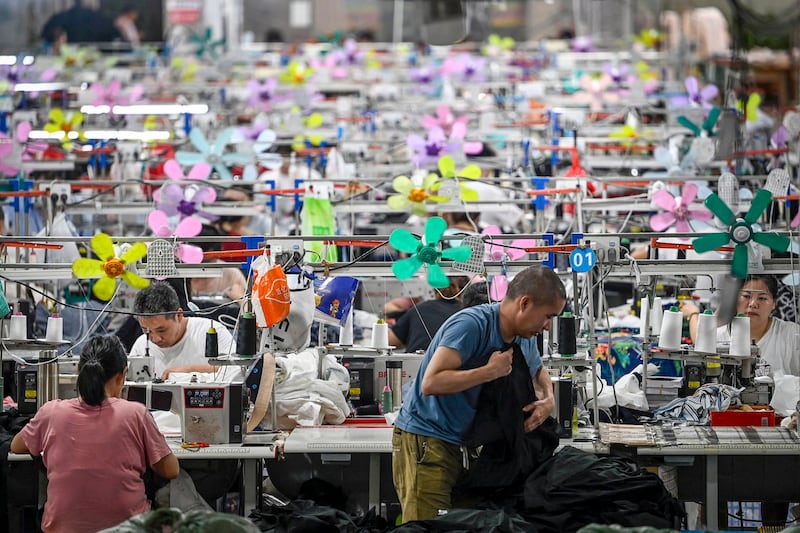More than 100 U.S. lawmakers have written to President Joe Biden requesting an executive order to close a “loophole” they say is allowing clothing made with Uyghur slave labor to reach American shores.
The "de minimis" exception allows imports worth less than $800 to enter the United States without being subjected to tariffs or customs inspections.
Critics have labeled it a “loophole” that allows 4 million packages to pass without scrutiny through customs each day.
In particular, they accuse Chinese low-price online retailers like Shein and Temu of exploiting the exception to sell clothing made with Uyghur slave labor directly to Americans. The exemption has also been blamed for allowing fentanyl to be imported through the postal system.
A long-promised bill to end the exemption was promised as part of this week's high-profile "China Week" flurry of China-related legislation by House Speaker Mike Johnson, but in the end was not included.

In an open letter sent to Biden on Wednesday, 126 lawmakers from the Democratic Party said that in the absence of legislative action, the U.S. president should use the “broad discretion” granted to him by existing trade law to restrict what items are eligible for the exemption.
They ask Biden to “disqualify commercial shipments from de minimis treatment,” so such items “no longer evade inspection, information disclosure requirements, or the requisite tariffs and taxes.”
In a press conference Wednesday, Rep. Tom Suozzi, a Democrat from New York who leads the Congressional Uyghur Caucus, said that short of legislation, executive action was the only way to ensure laws like the Uyghur Forced Labor Prevention Act can be properly enforced.
Related stories
[ US officials pledge to close forced-labor import loopholeOpens in new window ]
[ Fast-fashion outlets may be skirting Uyghur slave labor lawsOpens in new window ]
[ US House panel urges further action on Uyghur forced laborOpens in new window ]
“Some very clever people from the Chinese Communist Party … have come up with ways to get around all the stuff that we've negotiated,” Suozzi said, adding that Chinese online retailers “figured out how to use the new e-commerce systems” to skirt U.S. trade laws.
“They're under $800 and they come in through the mail, not through the ports of entry – nobody inspects it, nobody pays any tariffs,” he said of the packages entering under the exemption.
“Nobody makes sure they're not being made with forced labor in the Xinjiang region,” he said, where thousands of ethnic Uyghurs are believed to be trapped in factories producing everything from clothing to appliances.
Uyghur slave labor
Rep. Rosa L. DeLauro, a Democrat from Connecticut, said she believed it was “a near certainty” that clothing made with Uyghur slave labor was entering the United States under the exception.
DeLauro said the practice was also harming the U.S. textile industry, with Chinese brands that rely on slave labor “undercutting the competitiveness of many American industries – especially small clothing manufacturers – while enabling human rights abuses.”

Lori Wallach, the director of the Rethink Trade program at the Washington-based American Economic Liberties Project, said it would be preferable to have legislation to close the loophole forever.
“But the good news is that Congress previously granted American presidents broad discretion and authority to determine what types of goods can enter using de minimis – explicitly, in a statute, and it did so to prevent unlawful imports,” Wallach told the press conference.
Ending the ability of foreign retailers to send small packages directly to consumers would not “cut off” such imports, Wallach said, but would “force a different way” of doing business. Sellers would likely revert to container shipments that require advanced information to be filed with customs so items can “get pulled and inspected,” she said.
The White House did not respond to a request for comment about whether Biden would comply with the lawmakers’ request.
Logistical nightmare
Not all industry leaders are united against the exemption.
John Pickel, the senior director of international supply chain policy at the National Foreign Trade Council and a former trade official at the Department of Homeland Security, told Radio Free Asia that the “de minimis” provision was a necessary part of U.S. trade law.
Customs officials are already empowered to inspect goods shipped under “de minimis” if they believed the sender violated the Uyghur Forced Labor Prevention Act, he said, arguing the exemption was otherwise cost-saving for both government and consumers.

Removing it would require extensive further appropriations for customs officials to inspect more packages and collect duties, he said, and would cost consumers who would be forced to pay for the tariffs.
"I led the team that implemented the UFLPA at DHS, and I haven't seen any evidence of increased forced labor risk in the de minimis environment," Pickel said, pointing to a study that showed ending the exception would impose costs of up to $30 billion a year.
“Degrading de minimis would only raise import taxes on low-income consumers and small businesses and have no enforcement benefit at the border,” he said. “Instead of focusing on de minimis, policymakers should be looking for ways to validate information received by the government across all shipment values and entry environments.”
Edited by Malcolm Foster.
